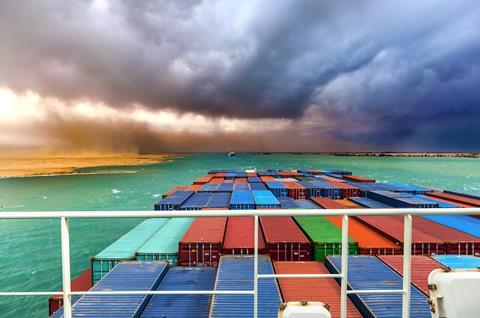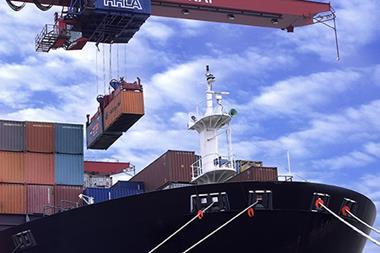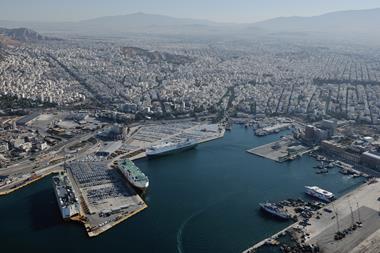PARTNER CONTENT
This content was paid for by Priority Freight and produced in partnership with Automotive Logistics
Facing unprecedented supply chain disruptions, from global shipping crises to extreme weather, the automotive logistics sector turns to innovative solutions like Priority Freight. With tailored resources and rapid response, they ensure the wheels of the industry keep turning, no matter the challenge

Automotive logistics is no stranger to disruptions. In recent years, the industry has faced many supply chain interruptions and delays, from the Covid pandemic to semiconductor supply shortages.
Knock-on effects are still rippling across the sector and more disruptions are set to come, with increasingly extreme weather events predicted and volatile situations unfolding in the Middle East and elsewhere, speed, control and visibility is more in demand than ever for the automotive supply chain.
Global supply chain crises
Almost every mode of transport used in automotive logistics has been hit hard by costly and largely unprecedented problems. Global shipping has been impacted severely in the past six months, with two of the world’s busiest shipping canals largely inaccessible. The Panama Canal is currently experiencing its worst drought since records began in 1950, causing shipping firms such as Maersk to opt for rail land bridges instead of using the waterways. Other vessels are being rerouted or charged large fees for passage. The recent conflict in the Red Sea because of Houthi rebel attacks on vessels have pushed shippers to avoid the Suez Canal and reroute around the Cape of Good Hope, costing more money, delaying shipments and increasing carbon emissions.
The disruption at sea is causing shippers to shift freight to rail and cargo alternatives, but these have their own problems too. In Europe, rail strikes have been straining logistics flows, while capacity shortages have been affecting rail in North America.
Road transport is not without risk either, as striking farmers in Europe have been blocking roads, climate protestors have been demonstrating on motorways, and more extreme weather around the world threatens road logistics services. In fact, billion-dollar weather events, which the US experienced every fourth month in the 1980s, are now occurring every three weeks and are expected to become even more regular in future. Weather events are the top logistics disruptor for supply chains, according to analytics firm Everstream, and are expected to continue for the foreseeable future as we enter the ‘era of extremes’.
Planning for the unpredictable
The question is: how can you plan for something unprecedented? Stuart Stobie, chief commercial officer at Priority Freight, says it is simple – by having a backup plan.
“With the way global events are happening, and the fact that the supply chain is becoming more globalised, the need to have a backup to your standard inbound logistics is becoming more important for companies,” says Stobie.
“We, at Priority Freight, excel where standard inbound logistics have failed. We offer supply chain certainty when our customers need it most.”
Priority Freight, a global time-critical logistics specialist, provides expedited delivery solutions no matter what the geography, size, weight, distance or mode of transport. The firm manages every aspect of the process for all modes of transport, including air freight and air charters, onboard couriers and road freight, to ensure that deliveries are always on time, even in extreme circumstances, while offering much needed control, visibility and security.

“The difference between a standardised freight network and a bespoke solution network, like Priority Freight’s, is that our people go the extra mile to make sure that those goods are delivered within the timeframe,” says Stobie. “We thrive on situations that require complex solutions to overcome seemingly unsurmountable logistical issues and never give up, where others would – we always find a way. In short, our role is to buy back time in the supply chain and assist in maintaining production.”
For one OEM, going the extra mile meant Priority Freight travelling 600 miles across the UK/France border to deliver 300 semiconductors within 20 hours. The manufacturer faced production line delays because of a shortage of chips and extensive delays at UK ports. Nevertheless, within one hour of enquiry, Priority Freight had completed customs papers, organised high-value insurance and had a driver onsite to collect the goods. Its bespoke high-tech transport management system and professional support network facilitated the rapid response, resulting in 300 chips worth £110,000 ($140,000) being delivered safely to Le Mans, France from Birmingham, UK. The timely delivery prevented a costly line stop at the Le Mans plant, preserving manufacturing schedules and company reputation.
A one-off expense, compared to snowballing cost
While emergency logistics can be seen as expensive, Stobie says that the cost actually balances out, especially in comparison to how costs can snowball when something in the supply chain goes wrong.
“It’s seen as an expensive mode of transport but, often, it’s a cost reduction,” he says. “The cost of plant or production downtime is seriously more expensive than prioritising the movement of these premium freight goods. There is less capacity on shipping routes now, so there is a need to have alternative support measures in place, aside from the standardised freight network.”
In addition, Stobie says the customer gets a lot more than guaranteed delivery when it comes to Priority Freight’s services – they also get peace of mind by having visibility every step of the way. Priority Freight allows customers to track the transports in real time via GPS links.

“We give the customer the speed, security, control and visibility that they require,” he says. “Using GPS links lets customers stay in control of the transport. Our customers can log into our in-house transport management system to track their goods and trace where they are, at all key points of the transport.”
Finding solutions to any problem
Whether supply chain disruption is because of adverse weather, strikes or supply shortages, Priority Freight says it is always flexible to find a solution to preserve manufacturing schedules.
“The most important thing is to ensure production lines keep running and it’s our team’s job to solve any logistical issues that would prevent that,” says Stobie. “Every transport is a bespoke solution and that’s the key to it. Everything we do is in response to a specific interruption in the supply chain and each solution is tailored to overcome that issue and maintain production, no matter the time of day or night.
The solution often changes whilst the transport is ongoing, and this is especially the case since Brexit. “When it comes to goods moving between the EU and the UK, customs clearance can add a further risk of cross-border delays,” says Stobie. “The additional declarations and increased amount of supporting paperwork adds a further bit of complexity to the transport.”
According to Stobie that requires being on the ball and asking ‘are we using a ferry? If the ferry isn’t running, can we use a train? If the train isn’t running, do we use air uplift? Is that cost acceptable to the customer? Has all the paperwork been completed?’
“It’s about having that flexibility and expertise to ensure all the intricacies are taken care of,” he says. “Our logistics experts work closely with our in-house customs team to offer a complete end-to-end solution for our customers. Priority Freight is licenced to manage the process in its entirety, both the physical movement of the goods and the customs obligations around it.”
Priority Freight’s highly experienced team of multilingual logistics specialists are committed to providing the fastest, most cost-effective and reliable solutions, time and time again. With a reaction time of under 15 minutes, and an on-time delivery rate of 99.6%, Priority Freight is dedicated to ensuring certainty of supply through disruption.

























![Global[1]](https://d3n5uof8vony13.cloudfront.net/Pictures/web/a/d/s/global1_726550.svgz)















No comments yet